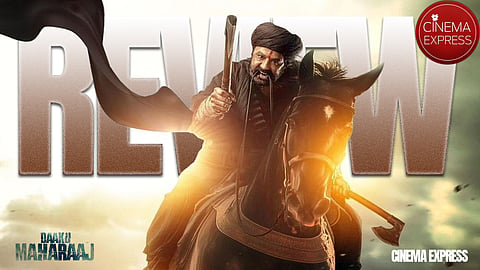Daaku Maharaaj movie review: Gets the hero-elevation right
Daaku Maharaaj(3 / 5)
When people deconstruct the artistic value of massy, commercial cinema, it becomes easy to ignore the craft required to make these films work. These are often films where the makers need to walk the tight rope between predictability and surprise, never letting the audience get either too comfortable or too confused with the turn of events. In Daaku Maharaaj, amidst its use of several cliched tropes, Bobby Kolli weaves in a moment where a harmless detail about a midnight snack returns as a rousing callback during a tense moment where lives are at stake. A similar callback arrives in the final act of the film, with a simple visual of a character running away from the frame only to walk back into the room with small, calculated steps. And yet, since you have seen this exact gait before, you know what’s coming. In Daaku Maharaaj, Bobby Kolli is aware of his material, his potential, and his ambitions—and all of them fortunately come together to produce an enjoyable, albeit conventional, film.
What remains surprising is the director’s attempt to bring a visual style to his narrative even when he isn’t busy staging the outlandish action sequences. During some of the hero-elevation moments early on, one can see the director struggling to maintain a rhythm. While the pre-interval portions are fairly run-of-the-mill, things never get boring—and Bobby manages to hold a grip even as the film veers into the flashback-driven second half.
Director: Bobby Kolli
Cast: Balakrishna, Bobby Deol, Shraddha Srinath, Pragya Jaiswal, Makarand Deshpande
There are plenty of things working for the latest Balakrishna starrer—most importantly Balakrishna himself. In the first half of the film, the senior actor barely has any dialogues, let alone punchy one-liners. This is where he lets his screen presence do the talking. However, the actor has a certain self-awareness in his stilted mannerisms and delivery that makes him enjoyable to watch. The film also seems self-referential in its integral use of the protagonist’s loyalists and supporters while he saves the world around him—there are more than a couple of dialogues where Sitaram’s well-wishers are labelled as ‘fans,’ and multiple moments where we see these ‘fans’ being in complete awe of their god-like saviour (Makarand Deshpande, I am looking right at you). These narrative choices lend an appropriately campy element to the film, adding to the enjoyment levels for an audience member who might or might not be a Balayya fan.
And amidst the commonplace saviour hero narrative, Daaku Maharaaj incorporates some impactful moments centred around class-divide and oppression. Many sequences in the second half, where the narrative shifts to a water-deprived village in Madhya Pradesh, are staged in an impressive manner, almost dystopian in its landscape (Kudos to cinematographer Vijay Kartik Kannan). More importantly, Sitaram’s journey from being an earnest civil engineer to a raging dacoit is believable and impactful at once.
There are still plenty of issues with the screenwriting here, particularly in the worn-out depiction of women as perennially vulnerable to sexual violence in a battle fought by men. Some of the grotesque dialogues given to villain figures as they speak about their violent desires don’t help. At the same time, this is also the kind of movie where Sitaram hands over a gun to a dacoit’s wife and eventually teaches her how to use it—and you realise that when it boils down to it, rebellion has no gender.
Expectedly, Shraddha Srinath gets an interesting character to play and leaves an impression despite limited screen time. On the other hand, Bobby Deol gets a staggering introduction scene and makes the most of his limited screen time. Many other performers in the film—Ravi Kishan, VTV Ganesh, Sandeep Raj—add a lot of value with their performances. Overall, Daaku Maharaaj remains an enjoyable and engaging affair, right till the end where a brutal violent showdown takes place inside a hospital. Despite all the temptations, the director never keels over, remaining level-headed even as the action gets gorier and gruesome, and delivering the goods.
And like in most other sequences, composer Thaman S remains a big part of the equation, doing a lot of the heavy-lifting, particularly in the hero-elevation moments. It is safe to say the prolific composer single-handedly elevates many of these moments with his thumping score, lending the narrative an impressive theatricality without going overboard. Like the internet generation would say, Thaman understood the assignment. Well, fortunately, as did Bobby Kolli.

